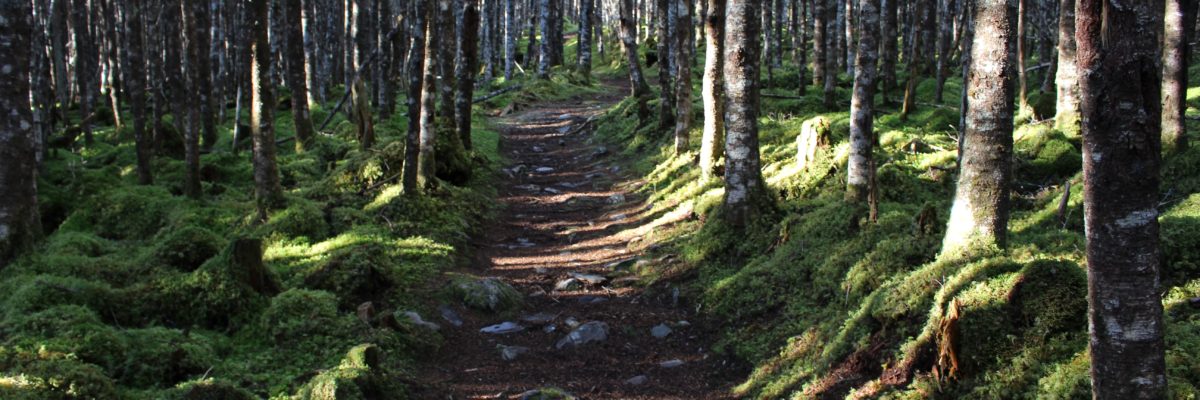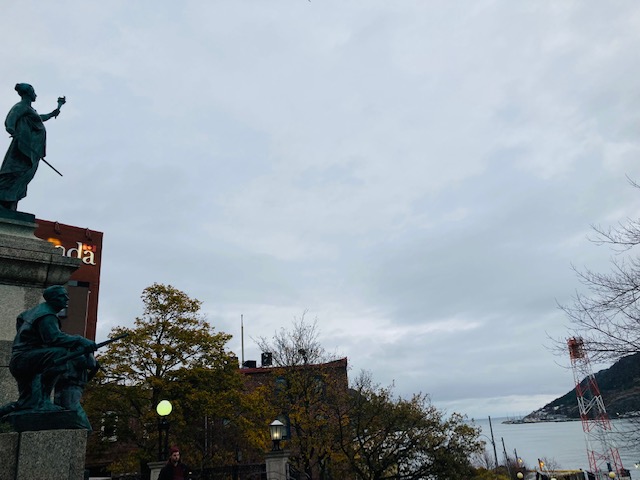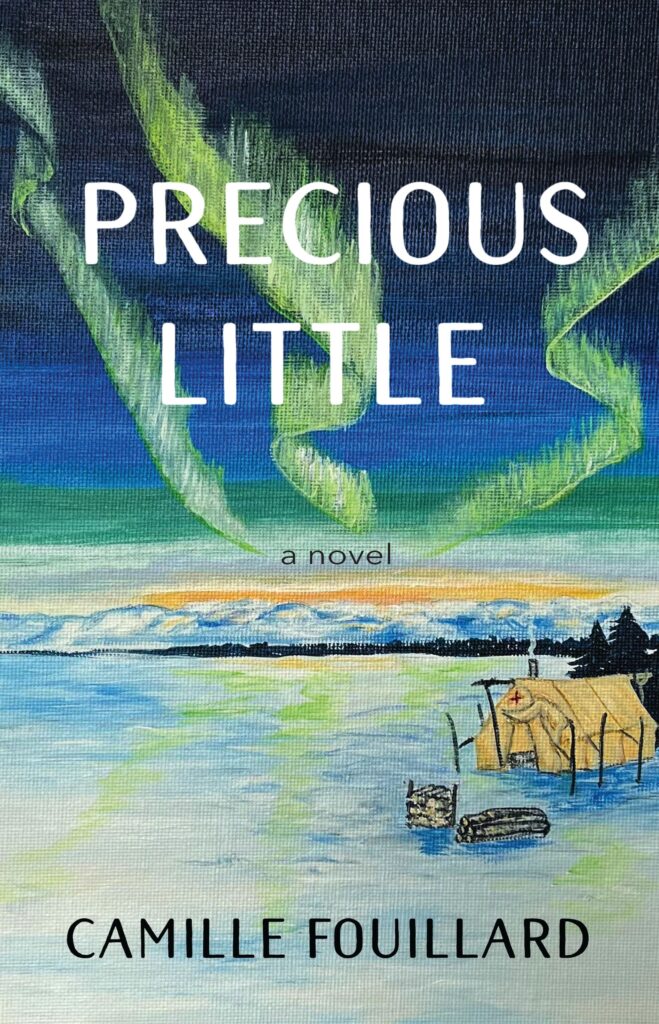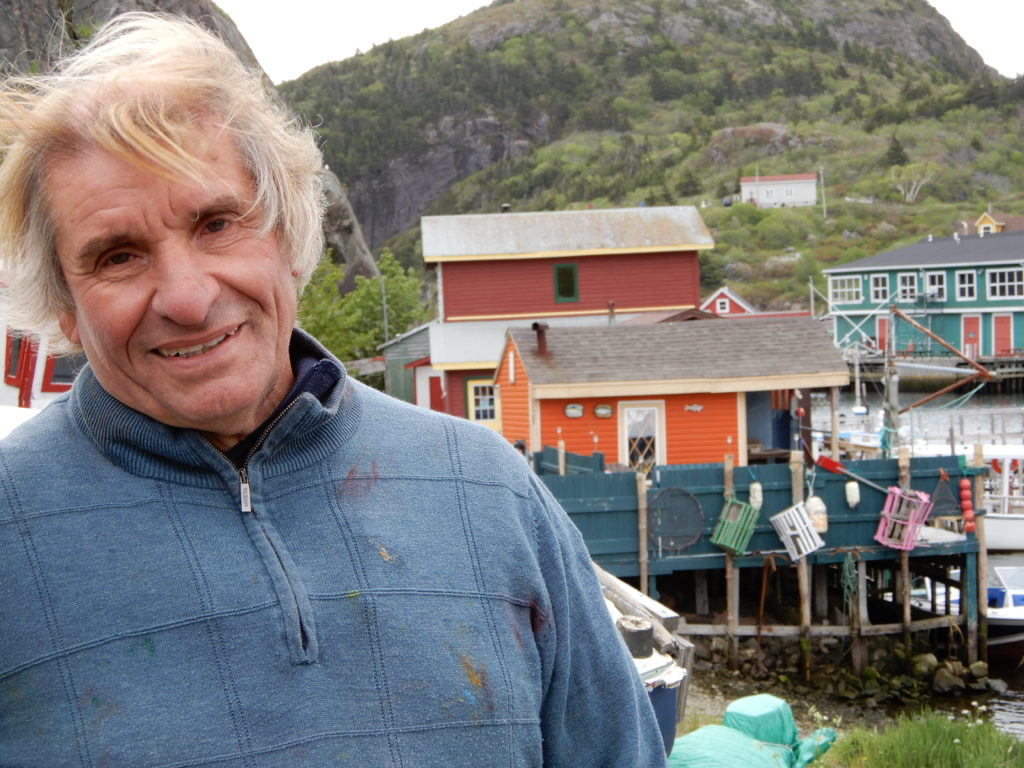Slowly Through the Fog Forest
BY Laura Temple
July 2018
There are times in all our lives when perspective takes a jarring shift, sudden moments when a new truth is lit up under fluorescent, operating room-quality light, like a flashing neon sign, or a moose illuminated in headlights. Yet, there are also those perspectives that come, not as bright flashes of insight, but rather a gradual illumination through a series of small, ordinary experiences.
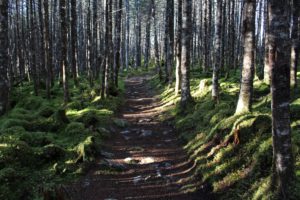
“Fog forest.” Photo by Laura Temple
Several years ago, I finished an Environmental Studies degree and then returned to my home province, full of enthusiasm and ideas, and ready for the perfect job to drop into my lap. As a starting point, I secured a short-term, seasonal job at an outdoor centre in a wilderness area on Newfoundland’s Avalon Peninsula. As an environmental educator, my job was to lead students through orienteering, shelter-building, and campfires, to teach ecological concepts, and to supervise sometimes rowdy meals in the cookhouse. Seasons passed, the big career job didn’t come, and I returned to the centre again and again. Overtime, working outdoors came to be a need rather than a luxury. Accordingly, out of necessity and idealism, I brainstormed, volunteered, and applied for funding, and pieced together a viable niche for myself. It’s now been 5 years, and I’ve come to love this place.
Ever since I began working here, I’ve taken solitary early morning walks in the woods, once per week, from May until November. I check on the woods the way I check my email and Facebook feeds when in the city.
This reminds me of my dad. Ever since he retired several years ago, he has been doing the exact same walk every morning. Shortly after sunrise he walks through the community where he lives to a pond by the ocean. He doesn’t have an email account or follow any social media, but he is up to speed on all of the goings-on at the pond: a visit from a seal, a change in wind direction, or the first skim of ice on the surface.
It’s November, near the end of my fifth year at the centre. I set my alarm for 7am this morning, as usual, and scoot out the door in my hat, mitts, and boots, tip-toeing so as not to wake anyone. I step outside the dormitory into the cold, damp air. From the staircase, I look down over the short spruce and fir trees and the pond at the bottom of the hill. Last night’s rain is dripping from the trees and mist blurs the crowns on the horizon. There’s a reason this place is called the Fog Forest.
It’s as much water as it is land. Like a lace tablecloth, there are threads of forest crocheted around endless ponds, bogs and streams. The landscape is like the dirt road that gets you here, bumpy and full of potholes. I noticed this last year while applying to a funder for canoes. Lacking a street address, I needed a way to explain the location. I printed a map and poured over the sea of ovals, finally drawing a star beside the shape I recognized as our pond, Echo Pond.
I follow the trail down to the pond, my boots crunching on the gravel. A squirrel is chattering hysterically and I stop for a moment to look around for it. I hear tires on the dirt road. When a vehicle comes, you can hear it winding slowly around the edge of the pond for a full 10 minutes before it arrives. I’m guessing this is a truck of moose hunters going to an area just past this centre. Besides teachers, kids, and our staff, hunters are the only ones we see way out here this time of year.
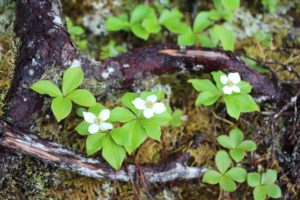
“Crackerberries.” Photo by Laura Temple.
I continue walking, eyeing my watch, so I’m not late for breakfast. I continue through the stunted forest. The growing season is short here and there’s a lack of soil and sun. Lack and impoverishment is just one perspective on this place though. For me, it’s equally about excess and abundance. There’s the abundance of fog that drifts across the hills, leaving needles, bark and stones glistening. There’s the lively and changeable wind that pushes clouds across the sky like ships in the open ocean, the sky constantly rearranged into new patterns. There’s water in every imaginable form: running in a steady stream under the foot-bridge, beading on tiny sundews, and this time of year, glazing the leaves of the crackerberries in morning frost.
This isn’t something I’d noticed when I began working here. I knew what crackerberries were, but didn’t look closely. Walking around here in the mornings has made me realize how little I’d noticed before.
I crouch nearer. I’ve been watching them transform since they first burst through the forest floor in the spring as green arrows, unfurling into six leaves. The flower petals come next. They are green at first, and then silky white. The stamens become spring-loaded with pollen, waiting for insects to set them off like mousetraps. I imagine the pollen as a tiny cloud of confetti, showering the unsuspecting pollinator. Successful, the petals become tinged in pink and drop away, as a cluster of spongy berries ripens. They cover the forest floor in red beads, an invitation to foxes and songbirds to eat and disperse them. Berries left behind shrivel like raisins in the fall, while the leaves turn yellow, orange and red, each with it’s own unique pattern of stripes and dots. Together the small leaves change the colour of the whole forest. The leaves are now dry and suspended in stiff curls, as if hair-sprayed.
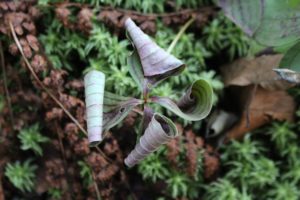
“Curled crackerberries.” Photo by Laura Temple.
Over time, this patch of forest has become continuously richer to me. It holds stories that are constantly unfolding, whether I’m there to follow the complex plots or not. Places, like people, are dynamic, have depth and take time to get to know.
I stand, thinking of turning back so I’m not late for breakfast. I’m so content here that it’s hard to leave. I’m like my dad, who likes the experience of walking in the woods, looking for a moose as much or more than he likes catching one. Though where he hunts moose, I hunt poems and photographs.
My dad has had a different life from mine. He lives in the same small town where he was born in the 1950s, his life contained in a tiny geographical area. He knows where to pick bakeapples in July, the best ponds for trouting, and what time the crows will fly overhead in the evening, to the abandoned ballfield. I’ve always noticed that he is content where he is.
I grew up in the same small town as my dad, but like everyone my age, I moved to the city when I was 18. I got used to the convenience of supermarkets. I found friends and music. I became fascinated by travel and exotic places, which I still am. Yet, over time I’ve come to realize that visiting a place can be an extension of productivity in the workplace and life. The tourist industry sells places as destinations that you can have, added to your collection like Brownie badges, or another item to check off your extensive to-do list, in a hurry against the inevitability of mortality. I’ve felt that too. But it doesn’t replace real attachment to a place.
I’ve often pondered the fact that my dad’s lifestyle of being close to a small piece of land is slipping away and I instinctively mourn this. Being grounded in one place in nature is key to a deep truth and perspective. This requires time to develop, and does not come from rushing or doing, but rather slowing down, relaxing and observing. I know I’m not able to visit every place in the entire world, but slowly getting to know the fog forest has illuminated my imagination to the richness of all places.
While you’re here:
… we hope you enjoy our website! Our online audience is growing every month, and that means that more people like you are seeing and reading incredible new work by Newfoundland and Labrador writers and artists. We want the people of the province to have access to high quality, contemporary writing about the unique and ever-evolving culture of this place, so we’re offering our online content for free. That said, if you’re able to help us keep providing this opportunity to both readers and creators in Newfoundland and Labrador, we encourage you to subscribe to our print magazine. Subscription details are here. If you ‘d like to support us with a donation or legacy gift (tax receipts available,) please contact us at rcohoe@mun.ca.

